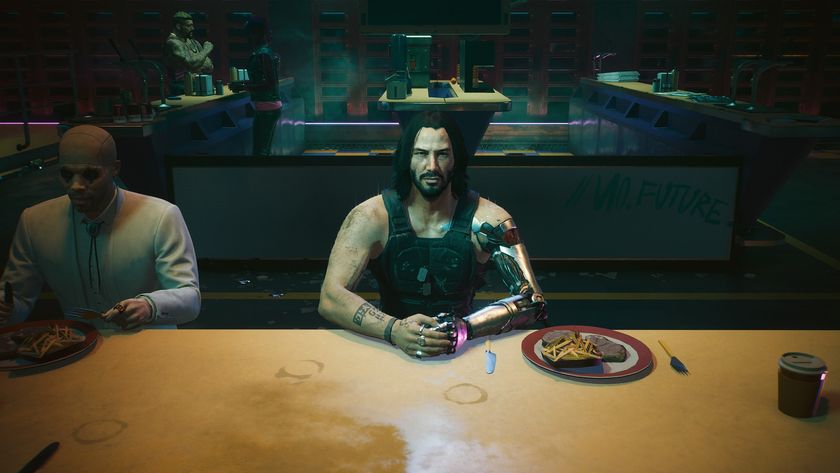Deus Ex: Mankind Divided - a deeper dive into an augmented, cyberpunk dystopia

Divided, conquered
Adam Jensen may not have asked for this, but we're certainly glad to be back in the cybernetically-enhanced saddle, exploring a techno-future run by mega-corps, the Illuminati, and hues other than color yellow. After suffering through an extended delay, Jensen's second adventure is about to kick off properly, as Deus Ex: Mankind Divided releases on PS4, Xbox One, and PC on August 23rd.
While Mankind Divided is certainly an iteration on an award-winning formula - improving expected bits like stealth, gunplay, and the like - it's also attempting to be a deeper, more engrossing tale than its predecessors. We've compiled the most important bits from our recent interviews and hands-on impressions into one place so you can get caught up on everything you need to know before you step into Eidos Montreal's latest cyberpunk dystopia next month.

Adam Jensen is a failure...
Human Revolution's final hours held some fairly catastrophic events, regardless of what final choice you made at the end. Square Enix Montreal isn't saying which, if any, ending Mankind Divided will build from (and, no, it won't read your old saves). But suffice it to say that - spoiler alert - augmented people around the world were sent on a brief rampage, the Panchaea geo-engineering plant was destroyed, and the Illuminati have successfully pinned both events on 'transhuman' terrorism.
In other words, Jensen failed, and the world has turned against all augmented people because he couldn't stop the Illuminati. As Mankind Divided begins, Jensen has signed up with Task Force 29, an international police organization dedicated to fighting augmented groups that are chafing against their new position on the bottom of the social order - or, to use the terminology of those on top, terrorists. But serving with Task Force 29 is largely a means to a more familiar end.
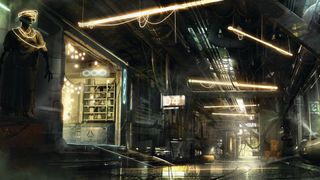
a double agent surrounded by liars...
Jensen knows firsthand that he doesn't have what he'll need to take down the Illuminati - yet. But by joining Task Force 29, he once again receives access to top of the line augmentations (more on those later), weaponry, and support personnel, not to mention great health coverage. Seriously, good medical is pretty important when your body is liable to start rejecting your arsenal of cybernetic implants if you miss a single dose of Neuropozyne.
As he works for the Task Force, Jensen secretly feeds information to an anti-Illuminati organization called the Juggernaut Collective. The collective is composed of hackers, activists, and the other sorts of people who are inclined to believe that an ancient shadow government runs the world. Unfortunately, Jensen can't fully trust the members of either group, and they'll often give him conflicting goals as he embarks on assignments around the world.
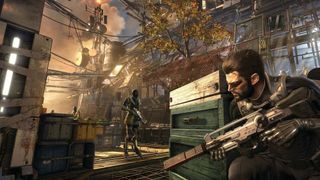
and a loose cannon counter-terrorist
The Deus Ex series has always walked its own path by letting players, well, walk their own paths. Instead of proceeding down a first-person corridor full of pulse-pounding scripted events, you can try to sneak into enemy compounds with some handy stealth augments (we're getting to the augments, promise), or even talk your way through them like a civilized human being.
Mankind Divided will push that freedom even further with stealth options that refine Human Revolution's well-crafted sneaking; one surprisingly important little tweak is a holographic indicator of your last known location, which makes it easier to give guards the runaround. More talkative players will also find their social exploits, including taking on side quests from locals, are much more likely to show up (and potentially bite you in the ass) later on in the story.
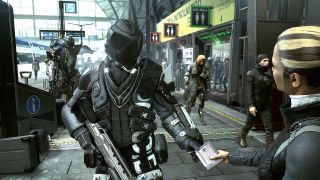
The key phrase for Mankind Divided's story is 'mechanical apartheid'
Deus Ex's subtitle offers a good hint as to what the sequel's story is going to touch on - namely, the idea that humanity's rush to augment itself has caused a rift between those who have opted to receive bionic enhancements and those who view it as an abomination of what makes us human. A cataclysmic event in Mankind Divided causes the deaths of over 50 million people, and has turned that rift into a chasm. In describing that conflict, Deus Ex has coined the term 'mechanical apartheid'.
After the devastating 'Aug Event', which hacked into millions of augmented humans' neural networks and sent them into violent rages, many non-augmented humans distrust those with cybernetic upgrades. Families are torn apart, people are subjugated and arrested because they choose to live with these mechanical fixtures, and humanity finds itself at an important crossroads. Human Revolution touched on this subject somewhat obliquely, but it appears that Mankind Divided is diving right in, focusing on the real human cost involved in culture based on fear and prejudice, and allowing you, as Adam Jensen, to make important choices that may affect how other people view augmented humans. Apartheid is an incredibly loaded word to throw around, and hopefully Mankind Divided's story can handle its themes and concepts with the grace and intelligence that a word like that demands.
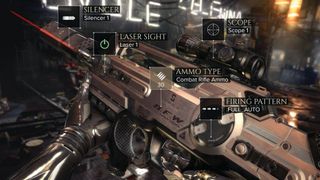
Square Enix Montreal is building a better gunfighter
Unfortunately, all those social and stealth options previously came at the cost of really solid-feeling combat. With Mankind Divided, Square Enix Montreal is trying to make the guns-blazing approach more of an entertaining option of its own than just a backup for when your other plans go pear shaped. To that end, the whole thing will just be a quite a bit smoother: you can adjust all of your weapon settings on the fly using a quick overlay, you can change up your hotkeyed augment abilities (getting there) at a glance, and more parts of the environment will yield under your fire.
You'll need all that enhanced combat capability if you plan to go Robo-Rambo: enemy forces are meant to be much better at coordinating their attacks, flanking, and using augments or other tools of their own. Hostile forces will also have a lot more variety, setting Jensen against augmented humans, exoskeleton-wearing cops, and killer mechs, to name a few.

Staging a boss fight renaissance
Speaking of hostile forces, you needn't worry about slogging through another set of protracted, incongruously inflexible boss encounters. Human Revolution's original bosses didn't really let you sneak around or try to resolve things peacefully - your only option was to dart around and gradually wear down their health bars. Though Square Enix Montreal takes full responsibility for Human Revolution's boss battles-of-attrition, they were actually contracted out to an external developer in interest of shipping the game on time.
The boss encounters in Human Revolution's Missing Link DLC (and the Human Revolution Directors' Cut) were handled in-house, and were much better about letting players fight on their own terms. Expect the climactic battles of Mankind Divided to follow in their example.
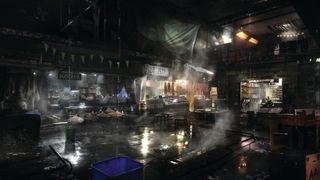
Augmenting the augments
And now its finally time to talk about the cybernetic heart of the Deus Ex series. Augments in Mankind Divided work basically the same way they did in Human Revolution, with additional abilities unlocked by earning or receiving Praxis kits, upgraded with experience points, and powered by bio-energy. You won't have to worry quite so much about conserving bio-energy this time around, as a fraction of it will regenerate Dishonored-style, but you still won't be able to lean on them exclusively to get the job (whatever it is) done.
You may still be tempted, because Mankind Divided includes twice as many augmentations as Human Revolution. New gadgets enhance every avenue of play: from a mark-and-track optics system that lets you keep an eye on distant enemies, to hand-mounted Tesla darts that let you silently incapacitate foes, to a bullet-deflecting Titan shield that can materialize at a moment's notice. Oh, and that nano blade? He can shoot it like a crossbow now.
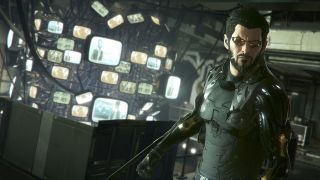
Side quests will be seamlessly integrated into the story
Most RPGs are split into two halves: there's the main narrative thrust that provides the impetus to explore and investigate, and there are the sidequests, those little distractions, errands, and minigames that flesh out your character and give more depth and richness to the story. Most of the time these two halves rarely intersect, but Mankind Divided is trying to converge the two into a seamless whole.
The idea is that optional objectives, various characters, and other moments will weave their way in and out of the story to make it feel like you're constantly tugging a loose thread on an unravelling sweater. Save someone during a mission, and they might open up a side quest later on that will give you more information on a more important quest - or he might not do anything at all. It's a structure that's meant to keep you guessing whether or not you're actually on a side quest at any given moment. And of course, all of this is augmented by Deus Ex's open-ended approach to exploration and player freedom. To see what kind of mischief you can get into by ignoring the plot and dinking around for four hours, check out our recent preview.
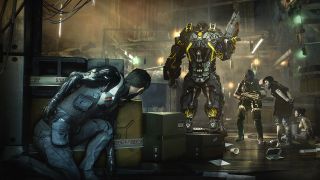
The ending won't just be "multiple choice"
Deus Ex: Human Revolution was a great game marred by some notable setbacks: crappy boss fights and multiple endings that were based less on the decisions you've made and more on your ability to flip one of four switches. While Mankind Divided is getting the obvious gameplay overhaul to fix the first issue, Deus Ex writer Mary DeMarle is hoping Mankind Divided's narrative structure will fix the second.
"Because on Human Revolution, we were having it all come down to that moment where there's a button press at the end of the game, and it triggers one of the different endings," DeMarle explained in a 12DOVE interview. "But on this one, we're actually looking at 'ok, we're going to give you different actions and different choices, and you go different paths, and how does that go?' So when you're embracing all those multifaceted, branching choices, et cetera, it gets hard enough. And then to pull that fulfillment of what the character wants, it does get very challenging. And I can't really give you a formula for doing it, it all comes down to constant iteration, constant play, and constant feel for the character and the player experience." Hopefully this means a world that's a bit more reactive to the decisions that you make, and keeps your choices close right up until the final credits.

Deus Ex was delayed for six months for "tuning, iterations, and refinement"
You probably remember that Deus Ex: Mankind Divided was originally supposed to launch some time in February - there was even a whole ill-conceived pre-order campaign that would have unlocked the game a few days earlier if enough people plunked their cash down early. Turns out that early release was moot anyway, as Square Enix delayed the RPG until its final release date, August 23rd.
Back in November, Eidos Montreal head David Anfossi gave a reason for the delay: "We are confident and proud of the game so far. However, as we are now playing through the game in full we can see that it will require more time in post-production for tuning, iterations, and refinement to meet our high standards." Sounds like Deus Ex was largely content complete by this point, and the team has diligently spent the last months making sure it's as good as can be.
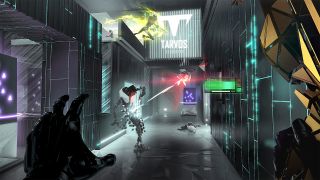
Breach mode is basically Deus Ex VR Missions
In addition to the main campaign, Mankind Divided will be getting a secondary mode called Breach - a series of smaller, bite-sized time-attack missions that will let you experiment with the game's suite of augments, weapons, and upgrades in ways the main game won't let you. While Breach's story won't affect Mankind Divided's narrative (and vice-versa), they're both running adjacent to each other and will reference similar characters and mega-corps.
As an anonymous hacker, you'll move through a series of missions, infiltrating powerful corporations and stealing their information to sell on the black market. Navigating through the digital server rooms and maze-like hallways while avoiding guards will require a mastery of all of the tools at your disposal, and you'll be ranked on your speed and effectiveness on each mission. You'll even unlock a few upgrades that 'break' the normal Deus Ex mechanics - since you're moving through a computerized construct, being able to double jump or having increased spatial awareness isn't as out of place as they would be in the main game.
12DOVE was first founded in 1999, and since then has been dedicated to delivering video game-related news, reviews, previews, features, and more. Since late 2014, the website has been the online home of Total Film, SFX, Edge, and PLAY magazines, with comics site Newsarama joining the fold in 2020. Our aim as the global GamesRadar Staff team is to take you closer to the games, movies, TV shows, and comics that you love. We want to upgrade your downtime, and help you make the most of your time, money, and skills. We always aim to entertain, inform, and inspire through our mix of content - which includes news, reviews, features, tips, buying guides, and videos.
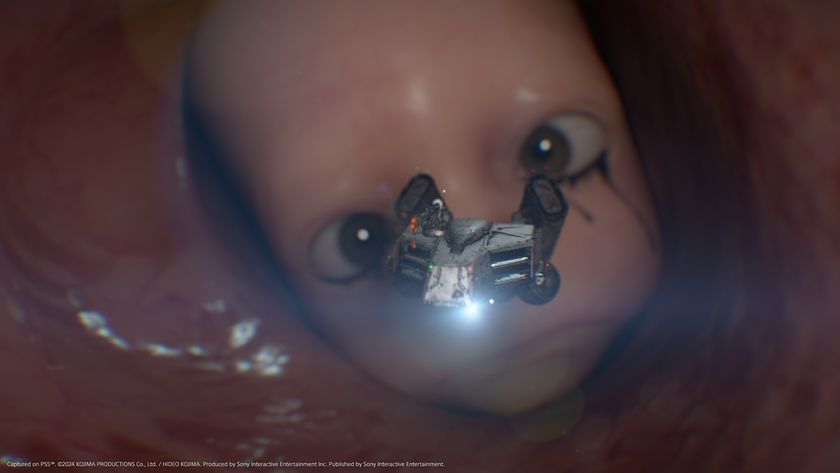
Death Stranding 2 draws ever closer as Hideo Kojima shares emotional behind-the-scenes update from "important scene" that wrapped recording for 6 voice actors at once

Cancelled The Last of Us Online game was "great," but former PlayStation exec says Naughty Dog had to scrap it after Bungie told them how much work it would be

Death Stranding 2 draws ever closer as Hideo Kojima shares emotional behind-the-scenes update from "important scene" that wrapped recording for 6 voice actors at once

Cancelled The Last of Us Online game was "great," but former PlayStation exec says Naughty Dog had to scrap it after Bungie told them how much work it would be
Most Popular







